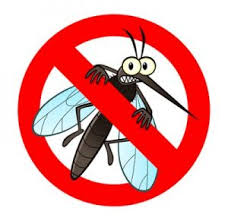Spraying Yards for Mosquitoes and Ticks: Is it Worth It?
- Monday, 31 August 2020 08:09
- Last Updated: Monday, 31 August 2020 09:18
- Published: Monday, 31 August 2020 08:09
- Joanne Wallenstein
- Hits: 3957
 This article was submitted by Susan Morse of Larch Lane and the opinions expressed are those of the author.
This article was submitted by Susan Morse of Larch Lane and the opinions expressed are those of the author.
Ads for treating mosquitoes and ticks in our yards show up in our mail and on TV, but the truth is that spraying our yards to eliminate these insects--even with “natural” treatments-- harms us, our pets and the environment. And, despite what these ads claim, spraying is ultimately ineffective in getting rid of mosquitoes and ticks. Here are the facts:
Pesticides poison our environment. All of us are aware that synthetic pesticides are directly linked to a range of serious illnesses and diseases such as cancer, neurological disorders, immune disorders and birth defects. Spraying synthetic pesticides is more hazardous than “natural” treatments, but both have serious impacts and issues.
Like synthetic pesticides, the chemicals used in “natural” mosquito and tick spraying harm humans and pets. The most common chemicals used to kill mosquitoes and ticks in “natural” treatment programs are pyrethroids which are neurotoxins. Pyrethroids are the man-made version of pyrethrins which come from chrysanthemum flowers. The EPA has classified several pyrethroids as carcinogenic to humans as well as causing other health problems including breathing and autoimmune issues. The National Institute of Health has also expressed concern over the use of pyrethroids as they can enter humans through skin contact and inhalation.
“Natural” applications contain chemicals which combine together to form potent toxins. Pyrethrins and pyrethroids are often combined with other chemicals called synergists, which increase their toxicity. All of the chemicals--and their cumulative toxic strength--that are applied to your yard may not appear on the list of pesticides that a company provides.
Like synthetic pesticides, these “natural” chemicals harm our environment and everything living in it. Spraying for mosquitoes and ticks kills all insects in a yard, including beneficial insects such as butterflies, honey bees and ladybugs. Since pyrethroids adhere to plant surfaces and can last up to three weeks, beneficial insects will also continue to be killed for weeks after the application. Spraying creates a wasteland for Nature’s pollinators and other insects that are crucial to our food chain and a healthy environment.
The EPA has also expressed concern over pyrethroids in runoff after heavy rains. Fish and other aquatic animals are particularly susceptible to the toxins contained in pyrethroids.
Spraying doesn’t get rid of your mosquitoes and ticks. Even if your yard is sprayed, there is nothing to stop mosquitoes and ticks from entering it from somewhere else. Some mosquito species have a flight range of 300 feet, but most have a flight range of 1-3 miles.
In addition, not all strains of mosquitoes are killed by spraying. Some mosquitoes will become insecticide-resistant, so they will survive and reproduce. This resistance causes greater environmental problems down the road.
What you can do instead. Both the EPA and the CDC recommend that before considering spraying, homeowners should first try to manage pests without pesticides. Instead of spending money on a toxic and fundamentally ineffectual yard-wide treatment, the following are some basic steps to control mosquitoes and ticks:
Mosquitoes:
*Eliminate standing water in your yard and in gutters. (That’s where mosquitoes breed.)
*Use EPA-approved insect repellant with lemon grass eucalyptus or picaridin. Visit the EPA’a repellant website to review your options.
*Plant plants that repel mosquitoes in pots or in your garden like lavender, marigolds, citronella grass, bee balm, catnip, rosemary, mint, basil, scented geraniums, sage, allium and floss flower.
*Place an oscillating fan (or any large fan) when you are on your patio or deck—mosquitoes are not strong enough to fly against the blowing air. It works!
*Cover up with clothing made out of synthetic fabrics like polyester, nylon, and rayon which are more tightly-woven, thereby helping to block mosquito bites.
Ticks:
*Apply insect repellant. See the EPA’s website cited above.
*Wear light-colored clothing so that you can easily spot a tick.
*Check for ticks when you have finished your outdoor activities. It takes only a couple of minutes.
*Shower after being outdoors. It’s easier to spot ticks, and they will likely wash down the drain.
*Place clothing in a drier for 10 minutes to kill any ticks that may be hiding on them.
Yard-wide spraying to eliminate mosquitoes and ticks should be given serious thought. Doing your own research instead of relying on representations made by companies whose business it is to perform this work is essential. The health of our families and environment depends on it.
References:
https://www.atsdr.cdc.gov/phs/phs.asp?id=785&tid=153
https://www.beyondpesticides.org/assets/media/documents/mosquito/documents/citizensHealthEffectsMosqP.pdf
Susan Morse
Larch Lane
Scarsdale






